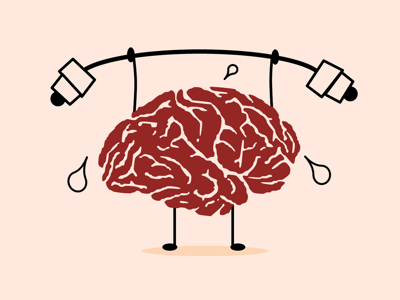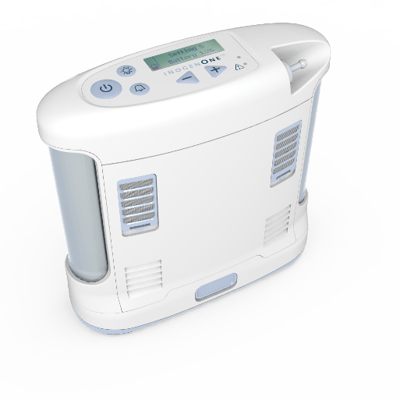Did you know that living with COPD can make it more difficult to think, make decisions, and remember things? It's true; studies show that COPD can cause mild cognitive impairment, a condition that affects your memory and other mental functions.
Unfortunately, many people are unaware of, or underestimate, the effect that COPD can have on your brain. Because of this, many COPD patients experience mental decline without ever realizing that their disease could be the cause.
This is a shame, especially because COPD-related mild cognitive impairment is both treatable and preventable. But in order to avoid it or minimize its symptoms, you have to understand what it is and what is has to do with COPD.
That's why, in this post, we're going to explain how COPD causes mild cognitive decline and how to recognize it if you have it. We'll also explain what you can do to prevent COPD-related memory loss and how to treat it if it appears.
Many people with COPD have to deal with mild cognitive impairment at some point or another, and it's important to know what you can do about it and what to expect if it happens. That's why we've included a wealth of practical knowledge, helpful advice, and effective techniques in this guide to help you manage memory problems and other cognitive symptoms caused by COPD.
What Does Mild Cognitive Impairment Mean?
In general, mild cognitive impairment (MCI) is a condition that causes minor problems with memory, focus, problem-solving, and attention. It happens to many people as they age, but respiratory diseases like COPD can both trigger and accelerate the condition.
Many people who experience forgetfulness or worry their brain is not as “sharp” as it used to be are actually experiencing the symptoms of mild cognitive impairment. However, MCI is slightly worse than the normal changes to memory and cognition you'd expect to see with age alone.
Mild cognitive impairment happens when the brain's cognitive functions are slightly lower than they should be. It can result from both temporary problems (e.g. oxygen deprivation) and permanent changes (e.g. structural damage) that happen to the brain.
Mild cognitive impairment is very common, affecting about 10-20 percent of people over the age of 65 and about 36 percent of people with COPD. Fortunately, it is a treatable, and sometimes even reversible, condition that can improve with diet, exercise, and other lifestyle changes.
It's important to note that the symptoms of mild cognitive impairment are often very subtle. Some people notice these symptoms on their own, but many don't recognize the signs of MCI until a friend or family member points it out.
Here are some of the most common signs and symptoms of COPD-related memory loss and MCI:
- Forgetting things like events and appointments often
- Forgetting words or struggling to come up with the right vocabulary more often
- Losing or misplacing things more often
- Feeling overwhelmed when faced with problems, making decisions, or making plans
- Difficulty understanding instructions or doing activities that require multiple steps
- Struggling to focus on simple tasks like reading, watching a movie, or having a conversation
- Difficulty finding your way around familiar places or environments
- Increased impulsive behavior or poor judgment
Sometimes, mild cognitive impairment is split into two distinct categories: memory-related or “amnestic” MCI, and MCI that affects thinking skills like decision making and completing tasks with several steps. Some people with MCI experience just one or two symptoms, while others experience a wider rage of cognitive problems.
 |
| Image from www.amenclinics.com |
In the words of Charles Emery, a COPD researcher from Ohio State University, “COPD-related cognitive impairment usually isn't noticeable to the untrained eye, but it can be a serious problem.” That's why people with COPD should be more aware of their risk for cognitive impairment and more familiar with what it looks like in everyday life.
Even if you don't realize it's happening, mild cognitive impairment can make daily living more difficult and have rippling negative effects. Even minor memory problems, like misplacing bills or forgetting to turn off the stove, can cause serious problems in everyday life.
Minor cognitive impairment can also make it difficult to manage your disease and keep track of your medications and other treatments. For example, it could cause memory problems that lead you to use your medications incorrectly or skip doses accidentally, making you more vulnerable to life-threatening exacerbations, quicker disease progression, and other disease complications.
Experiencing difficulties with memory and concentration can also cause you to feel frustrated and stressed, even if you aren't aware that your symptoms are caused by MCI. This can lead to mental disorders like anxiety and depression, especially if the condition is left untreated for too long.
Luckily, COPD-related cognitive impairment can be treated and managed to minimize the symptoms and its effect on your quality of life. With healthy lifestyle changes and proper treatment, you may even be able to regain some or all of the cognitive ability you've lost, especially if you catch it early on.
Importantly, early treatment for mild cognitive impairment can prevent future cognitive decline and more serious conditions like dementia. Because it often results from low blood oxygen levels, recognizing mild cognitive impairment can also alert you to other problems that you need to address in order to better manage your COPD.
The Relationship Between COPD and Memory Loss

At first, it might seem strange that COPD, which is primarily a respiratory disease, could cause mental deficiencies and memory problems. However, a variety of studies have confirmed that there is a direct link between lung function and cognitive decline.
Research from the Mayo Clinic, for instance, found that having COPD can double your risk for mild cognitive impairment, including memory loss. The risk is even higher for people with more advanced COPD and people who use supplemental oxygen therapy.
Some people experience general cognitive impairment that affects many areas of cognition, while others only experience difficulties in one or two areas. Specific cognitive abilities that tend to be affected are memory, information processing, attention, concentration, executive function, and self-control.
However, research also shows that people with COPD—even advanced COPD—only show very slight cognitive decline. According to one study, people with severe COPD scored, on average, just one point less than people who didn't have the disease on a 35-point scale of cognitive ability.
But even though this amount of cognitive decline might seem trivial, it is not something you should ignore. Mild cognitive impairment is enough to affect everyday life and impair your ability to manage your COPD.
That's why it's important to look out for even minor symptoms, especially since cognitive impairment is much more treatable in the early stages. Recognizing the earliest signs of MCI and taking them seriously is a necessary step toward making the changes that can minimize your symptoms and prevent more serious cognitive issues in the future.
How COPD Causes Cognitive Impairment

To understand why COPD causes cognitive impairment, you have to realize that COPD is not just a simple breathing disorder. It is a disease that causes inflammation, strains your heart, and starves your body of oxygen.
One of the key links between COPD and MCI is low blood oxygen levels, known as hypoxemia, which gets worse in the later stages of the disease. This lack of oxygen affects every organ in your body, but it is especially harmful to your heart and brain.
The brain is particularly sensitive to the effects of hypoxemia because it needs so much oxygen; the brain uses up a large amount of energy and needs a continuous flow of oxgen-rich blood in order to function. Because of this, low blood oxygen levels are particularly bad for your brain, and they can lead to brain hypoxia and cognitive impairment.
As a result, memory and cognition problems are much more common in people with more advanced and severe COPD. As the the lungs lose more and more of their ability to function, blood oxygen levels drop lower and more often than they did before, increasing the risk for cognitive symptoms.
However, hypoxemia is not the only reason that people with COPD experience mild cognitive impairment. Researchers believe that a lack of physical activity could also be a cause.
After all, many studies have shown a strong link between regular exercise and better cognitive function. There are many reasons for this, but improved cardiovascular health and circulation seems to play a major role.

Unfortunately, inactivity is a huge problem among people with COPD because their breathing symptoms make exercise very difficult. However, this lack of physical activity worsens COPD symptoms and causes the disease to progress more quickly.
The result is that it becomes harder for your body to supply enough oxygen to your brain and the rest of your body. This can lead to a variety of complications including cognitive impairment and dementia.
COPD also significantly increases your risk for cardiovascular disease for many different reasons, including hypoxemia, lack of exercise, and other disease complications. Cardiovascular disease is a well-known cause of cognitive impairment, in part because it causes poor circulation and damages the blood vessels in your brain.
COPD also causes chronic inflammation, which is a major risk factor for both heart disease and cognitive decline. Researchers believe this happens in part because long-term inflammation causes harmful changes to the blood vessels and tissues in the brain.
Researchers also suspect that a history of smoking—which the vast majority of people with COPD have—can make you more prone to mild cognitive impairment. One study showed, for instance, that MCI is much more common among people who have smoked, are currently smoking, or who are exposed to secondhand smoke for at least one hour per week.
COPD and Dementia

Studies show that both COPD and mild cognitive impairment can significantly raise your risk for dementia. That's because the same conditions that cause COPD-related cognitive impairment can also cause long-term damage to your brain.
Dementia is a general, umbrella term that is used to describe a variety of different types of cognitive decline. It is much more severe than mild cognitive impairment, but it often starts with MCI that gets worse and progresses to dementia over time.
Here are some of the major signs and symptoms of dementia:
- Memory loss that significantly interferes with daily life
- Difficulty completing simple, familiar tasks
- Confusion about dates, places, and how much time has passed
- Difficulty making plans, solving problems, and keeping up with responsibilities
- Difficulties with language, including speaking, writing, keeping track of conversations, and coming up with words
- Frequently misplacing things and forgetting about major events
- Social withdrawal, including giving up on hobbies or work
One of the main ways that COPD leads to dementia is by depriving your brain of oxygen. If your blood oxygen levels stay too low for too long, it can cause permanent damage to the blood vessels and tissues in your brain.
Other COPD-related symptoms and complications can also cause dementia, including chronic inflammation and heart disease. Basically, most of the conditions that can cause mild cognitive impairment have the potential to also cause dementia if they are severe enough or happen frequently enough.
However, it's important to note that, even though mild cognitive impairment and memory loss can be early signs of dementia, they don't necessarily mean that you will develop the disease. For many people with the condition, MCI stays stable or even improves with time.
 |
| The appearance of a normal brain versus a brain with severe Alzheimer's Disease, a form of dementia. |
On the other hand, cognitive problems could be a sign that your COPD could cause, or is causing, serious damage to your brain. This is more likely to happen if your symptoms are severe or you suffer from frequent, severe hypoxemia.
If you have COPD and experience any symptoms of cognitive impairment, you need to be particularly diligent about managing your disease. By taking your medications, getting regular checkups, and living a healthy lifestyle, you can minimize your COPD symptoms and keep your blood oxygen levels high.
In many cases, it is possible to prevent COPD-related cognitive impairment and dementia with healthy living and proper COPD treatment. However, in order to do this, you might need to make some serious changes to your diet, your lifestyle, and how you manage your disease.
How to Prevent & Minimize Memory Loss Caused by COPD

If you have COPD, the best way to prevent memory loss and cognitive impairment is to keep your heart and lungs in the best shape possible. That means managing your COPD properly and building healthy habits that help you keep your body strong.
If you already have mild cognitive impairment, these same methods may even help you reverse your cognitive symptoms. At the very least, making healthy changes can prevent more severe cognitive issues and make a noticeable difference in your health and quality of life.
In the next sections, we'll show you a variety of simple things you can do in your daily life to boost your cognitive ability and prevent cognitive decline. The earlier you take action the healthier your brain will be as you continue to manage your COPD.
Exercise Your Body

Exercise is an irreplaceable tool for keeping your heart, lungs, and brain healthy, especially if you have COPD. It can improve your circulation, improve your ability to breathe, and help your body get more oxygen to your brain.
Studies show that physical fitness reduces cognitive decline caused by aging and even improves general cognitive ability. Other studies on people with COPD even suggest that exercise alone can improve at least some symptoms of cognitive impairment.
On the other hand, lack of physical activity weakens your heart and lungs, worsens breathing problems, and leads to a variety of other health complications. Inactivity is particularly hard on your cardiovascular system, leading to high blood pressure, heart disease, and worsened hypoxemia.
That's why it is so vitally important to get regular physical activity if you have COPD. That means getting at least 20-30 minutes of exercise, including light to moderate-intensity aerobic exercise (e.g. walking, swimming, or jogging), at least 3-4 times per week.
While this might seem daunting at first, don't let it scare or discourage you. You don't have to jump in all at once; you can start small and work at your own pace.
You can start with simple, low-impact activities like walking, stretching, and doing light aerobic exercises. Anything you can do to add more physical activity to your schedule will help, including hobbies like gardening.

You could also join a gym, try a sport, or take regular walks in a park you enjoy nearby. There are many different ways to exercise, and all you have to do is find a few activities that you can stick with and enjoy.
Building the habit can be difficult, but it is certainly worth the effort it takes. It can not only significantly reduce your risk for cognitive decline, but it can also strengthen your heart, reduce your symptoms, and delay the progression of your COPD.
To help you get started, we've put together several guides full of practical tips and tricks for exercising with COPD. Take a look at any of them by clicking the links below:
- Hobbies and activities that are well-suited for people with COPD
- Exercises you can do at home to improve your COPD
- How Pulmonary Rehabilitation can improve your ability to exercise with COPD
- Breathing techniques you can use to reduce shortness of breath when you exercise
Exercise Your Brain

Much like physical exercise helps keep your body strong, mental exercise can help you keep your brain and cognitive functions strong. That's why it's important to keep your brain active as you age, and especially if you suffer from COPD.
Research shows that one of the best ways to do this is by learning new things and doing activities that require mental focus. These kinds of activities strengthen important neural pathways in your brain and can even improve your mental function.
Activities that exercise your brain include things like reading, social activities, and creative endeavors like writing and painting. Other hobbies like playing chess or doing puzzles can also help keep your brain sharp.

Studies show that learning a new skill like playing an instrument or speaking a new language is particularly effective at preventing cognitive decline. You can also pick up new skills by taking a class at a local college or community center, or by joining an activity club.
In general, making an effort to use your brain in new ways and learn new things can help you preserve your memory and cognitive skills as you live with COPD. It can also reduce your chances for developing more serious forms of cognitive impairment, including dementia.
Maintain a Healthy Weight

Being underweight or overweight is bad for your brain and can increase your risk for cognitive issues, including memory problems and MCI. Unfortunately, many people with COPD struggle to maintain a healthy weight.
That's because having COPD can make it both difficult to gain weight and more difficult to lose any extra weight you have. COPD symptoms also make it more challenging to establish healthy habits that help you manage your weight, such as living an active lifestyle, getting enough sleep, and preparing home-cooked meals.
In particular, being overweight or underweight can make it difficult to exercise and make your breathing problems worse. This, in turn, can lead to a variety of health problems including heart disease and mild cognitive impairment.
The best way to get yourself to a healthy weight is to exercise regularly and pay close attention to nutrition and portion control when you prepare meals. It helps to track your calories and nutrients every day, that way you can see what you're doing well and where you can improve.
If you need help, you can always ask your doctor to help you come up with a diet and exercise strategy that's appropriate and manageable for you. You can also consult a specialist, such as a dietitian or physical therapist, who can put together a personalized plan to help you reach your ideal weight.
Quit Smoking
+
Research shows there is a very strong link between tobacco smoking and cognitive impairment. A large number of studies have found that people who smoke or have a history of smoking are significantly more likely to experience dementia or mild cognitive decline.
While researchers are not exactly sure why this is, smoking seems to cause damaging changes to the brain that affect memory and cognition. And since an estimated 80-90 percent of COPD cases are caused by smoking, researchers believe this could partially explain the high risk for mild cognitive impairment among people with COPD.
However, studies show that, if you quit smoking, you may be able to reverse this effect. The earlier you quit the better, and the less likely you are to experience future memory problems and mild cognitive decline.
However, keeping your brain healthy is only one of many reasons you should quit smoking. Quitting can significantly improve your COPD symptoms and your ability to treat the disease, as well as reduce your risk for a variety of COPD complications including exacerbations and heart disease.
Eat a Nutritious, Healthy Diet

If you don't get enough nutrients from your diet, you starve your brain of the fuel it needs to function. This can lead to memory problems, mild cognitive impairment, and increase your risk for dementia.
In fact, research has long reported the connection between malnutrition and cognitive decline in older adults both with and without COPD. Unfortunately, malnutrition is particularly common in people with COPD, and contributes to the high instance of cognitive decline in people with the disease..
Several COPD symptoms are responsible for making it difficult for many people with the disease to get enough calories and nutrients from their meals. These include lack of appetite, lack of energy, and severe shortness of breath that makes it difficult to breathe when you eat..
Another very common COPD symptom is chest pressure and discomfort that makes it difficult to take full breaths of air. When your stomach is full of food, it can make this symptom worse, which makes mealtimes an uncomfortable and dreaded chore for some people with COPD.
Many COPD patients also struggle to shop for whole foods and cook healthy meals because of COPD symptoms like fatigue, depression, and difficulty standing and walking for extended periods of time. People who use supplemental oxygen also have to face extra challenges when cooking, shopping, and eating.
What's more, COPD actually makes your body burn extra energy when you breathe. Because of this, many people with COPD need to eat 400-700 extra calories per day more than people who don't have the disease.
Fortunately, there are many strategies you can use to make getting proper nutrition easier with COPD. It's also important to treating underlying COPD symptoms and manage your disease the best you can.
Eating smaller, more frequent meals, for example, can help minimize discomfort and breathing difficulties when you eat. You may also need to eat more calorie-dense foods to meet your increased caloric needs.
You might also want to talk to a nutritionist or dietitian to work out meal plan that fits your lifestyle and abilities. You might find that a little bit of professional help goes a long way toward getting yourself on track to a nutritious diet.

If you are underweight or worried you're not getting enough nutrients, you should also ask your doctor to test you for nutritional deficiencies. If you are deficient in any vitamins or nutrients, your doctor can tell you what foods, vitamins, and supplements you need to correct it.
Most importantly, you should fill your meals with whole, non-processed foods while including a good balance of lean meats, whole grains, healthy fats, and lots of vegetables. By eating right and restoring proper nutrition in your body, you can both prevent and treat cognitive impairment caused by poor diet.
For more tips on how to eat a healthy diet with COPD, take a look at any of the following helpful guides:
- Healthy foods to eat for COPD
- Foods you should NOT eat if you have COPD
- Tips for shopping and cooking for people with COPD
Talk to Your Doctor about Adjusting Your Medications or Using Supplemental Oxygen

If you start to show any signs of mild cognitive impairment, including memory troubles, you should bring it up with your doctor right away. MCI could be a sign that your current treatment plan isn't enough to keep your COPD under control.
If you discuss your cognitive symptoms with your doctor, he can help you determine if your treatment regimen needs to change. If so, he might adjust your medication dosages, how frequently you take them, or have you try new medications that could be more effective.
If you come to your doctor with symptoms of cognitive impairment, he will probably also check your blood oxygen levels to see if they are too low. That will help him better evaluate how well your treatments are working, and whether or not you need supplemental oxygen to raise your blood oxygen levels and prevent cognitive impairment.
If your blood oxygen saturation is below 90 percent, that means you're not getting enough oxygen to meet your body's needs and you likely need supplemental oxygen therapy. If you already use supplemental oxygen, experiencing mild cognitive impairment could be a sign that your oxygen prescription needs to change.
For example, your doctor may decide to increase your oxygen dosage or instruct you to use supplemental oxygen more often. You might also need to start using oxygen while you sleep, since nighttime oxygen deprivation is a common cause of MCI.
Reduce Nighttime Breathing Symptoms and Hypoxemia

It is extremely common for people with COPD to get less oxygen and experience worse hypoxemia at night than they do during the day. That's because COPD symptoms and breathing problems tend to get worse at night, especially after you fall asleep.
Unfortunately, studies show that nighttime oxygen deprivation is particularly bad for your brain. It can cause memory problems, mild cognitive impairment, and even lead to dementia. That's why it's important to minimize your COPD symptoms at night and create a sleeping environment that makes it easier to breathe.
In general, you should always take your medication as directed in the evenings to keep your symptoms managed. You might also want to clear the mucus out of your airways before you go to bed to reduce airway obstruction while you sleep.
You should also do your best to make your bed and bedroom a safe and comfortable place to sleep. Most importantly, you should keep your bedroom clean and clear of dust and anything else that could irritate your lungs and trigger your COPD symptoms.
After all, you spend at least 8 hours a day in your bedroom, so it's important to make sure that the air you breathe while you're in there is healthy and clean. You also want your bedroom environment to be comfy, uncluttered, and stress-free, so you can get the sleep you need to keep your body and brain in tip top shape.
It's also important to know that nighttime hypoxemia and mild cognitive impairment could be a sign of a sleep disorder known as sleep apnea. Sleep apnea is very common in people with COPD, which is why you should tested for the condition if you notice any of the symptoms, such as frequent snoring or pauses in breathing while you sleep.
To learn more about sleep apnea, COPD-related sleep problems, and how to combat nighttime COPD symptoms, check out the following guides we've written on these subjects:
- Sleep Apnea and COPD
- How to Get Better Sleep if You Have COPD
Prevent COPD Exacerbations

The worse your COPD symptoms are, the more likely you are to experience mild cognitive impairment. That's why it's so important to take your medications, minimize your symptoms, and manage your disease as effectively as possible.
Part of managing your disease properly is doing what you can to avoid COPD exacerbations. Exacerbations can make your symptoms significantly worse for an extended period of time, which can cause serious hypoxemia and other complications that worsen cognitive decline.
In fact, research shows that COPD patients in the midst of an exacerbation have worse cognitive functioning than patients with stable COPD. One study found that nearly sixty percent of patients with COPD exacerbations showed mild to severe cognitive impairment.
Since respiratory illnesses and lung infections are the number one causes of COPD exacerbations, the best thing you can do to prevent them is avoid getting sick. That means practicing proper hygiene and building healthy habits that can help keep your immune system strong.
Severe, lengthy, and poorly-treated exacerbations can cause long-term lung damage that can increase your risk for mild cognitive impairment. That's why it's important to catch exacerbations early, treat them carefully, and minimize the symptoms they cause.
If you notice the signs of an exacerbation, your COPD treatment plan should tell you what to do. If you work with your doctor and follow that plan carefully, you can reduce your risk of experiencing complications like MCI.
Here are some general tips for preventing COPD exacerbations:
- Keep your vaccinations up to date, including your yearly flu vaccine (and potentially a pneumonia vaccine if you are over the age of 65)
- Avoid sick people and practice good personal hygiene to limit your exposure to germs (especially during cold and flu season)
- Quit smoking and avoid all other sources of secondhand smoke
- Stay away from triggers that worsen COPD symptoms, including dust, allergens, air pollution, fragrances, and cleaning chemical fumes
- Always take all of your COPD medications on time
- Track your symptoms carefully and follow the steps in your COPD action plan when you notice your symptoms getting worse
- Practice healthy lifestyle habits like eating a healthy diet, staying active, and getting enough good-quality sleep
- Take a pulmonary rehabilitation class to learn techniques and skills that can help you improve your COPD and avoid future exacerbations
To learn more about how to avoid exacerbations, take a look at our extremely comprehensive (and 100% free!) guide, which includes more than 15 pracitcal tips for how to avoid COPD exacerbations.
Conclusion
Mild cognitive impairment is a very common symptom of COPD, but it is still a little known condition. Too often, memory loss and MCI don't receive the attention they deserve from both doctors and patients with COPD alike.
In recent years, some COPD researchers and medical workers have spearheaded efforts to raise awareness of mild cognitive impairment. They encourage patients to watch for the symptoms and urge doctors to screen their COPD patients for MCI more often.
In general, the best way to minimize COPD-related cognitive decline is to live a lung-healthy lifestyle and manage your disease properly. That means eating a healthy diet, getting plenty of exercise, following your COPD treatment plan, and making other lifestyle changes your doctor recommends.
It's also important to avoid things that worsen your COPD symptoms, including illnesses and exacerbations. You should also protect your lungs from airborne dust, pollution, and other things that could irritate your airways and reduce your lungs' ability to function.
The more you learn about COPD, the better you can manage the disease and keep your lungs working as efficiently as possible. The healthier your lungs are, the better you can breathe, and the better you can prevent COPD-related cognitive decline.


.png)



